 Photo by Martin Geiger on Unsplash
Photo by Martin Geiger on Unsplash
Chinese, Japanese car makers score poorly in green rankings
German automakers continued to lead in decarbonisation.
Japan’s Suzuki and Toyota, as well as China’s Great Wall Motor, ranked the lowest in terms of carbon reduction efforts among automakers globally, according to advocacy group Greenpeace.
Greenpeace East Asia’s annual auto ranking showed Suzuki did not sell a single battery electric vehicle (BEV) in 2022 while less than one in every 400 vehicles sold by Toyota last year were BEVs.
Suzuki ranked the last in the study that tracked the decarbonisation efforts of 15 car manufacturers globally, while Toyota ranked 13th.
Great Wall Motor was the second least green automaker after having BEVs account for less than 10 percent of its overall sales last year as it continues to pump out more sport utility vehicles (SUVs).
Korean brand Hyundai and its sister firm Kia also fared poorly amid growing SUV sales, ranking ninth in the rankings.
The study showed SUVs, known for having high steel consumption and low fuel efficiency, accounted for more than half of the combined car sales of Hyundai and Kia in 2022.
China’s largest car maker SAIC, meanwhile, posted the highest EV sales last year, although its slow progress on supply chain decarbonization pulled down its ranking to third place. Three out of ten vehicles sold by SAIC last year were EVs, according to the study.
It trailed behind German automakers Mercedes-Benz and BMW which claimed the top two spots in this year’s green rankings.
Greenpeace excluded pureplay EV firms like BYD and Tesla in the rankings.
“Ultimately, we need traditional automakers to dramatically speed up their adoption of electric vehicles. Brands like Toyota and Hyundai face a very real market threat from all-electric vehicle-makers like Tesla and BYD, but in the face of evolving technology, they’re dragging their feet,” said Greenpeace East Asia deputy program director Ada Kong.















